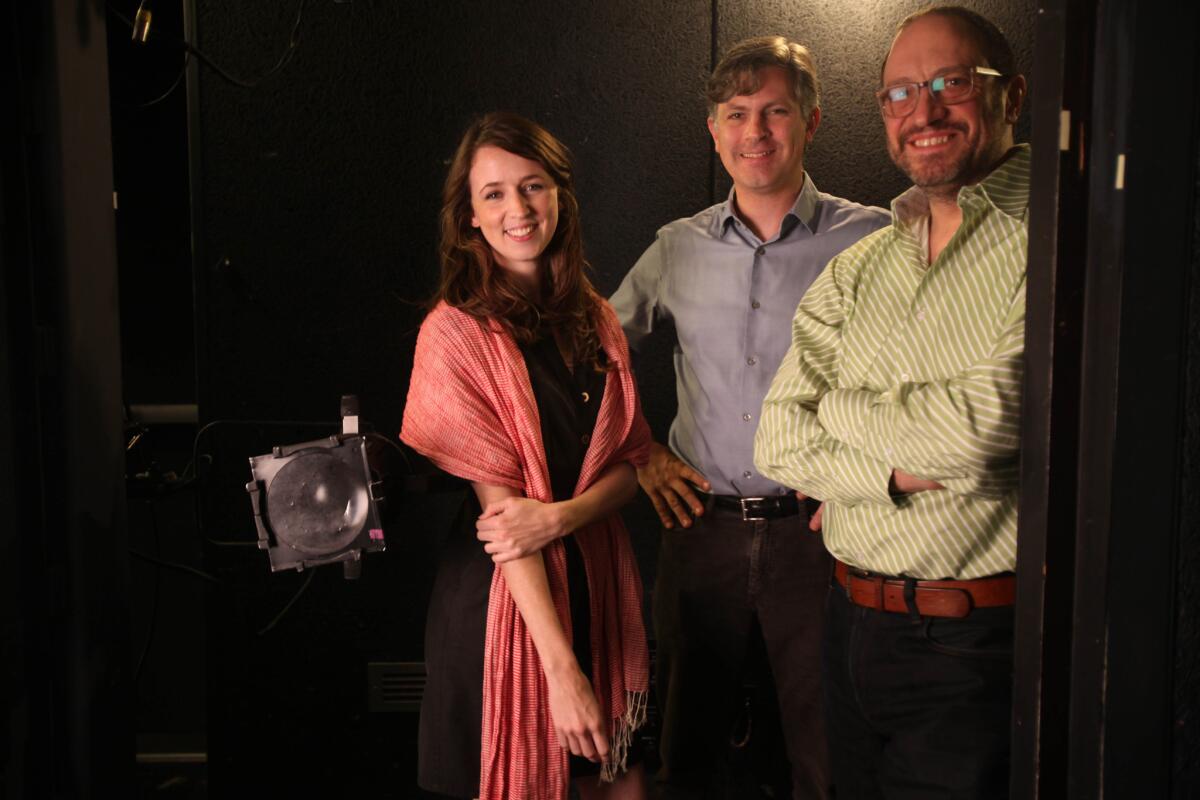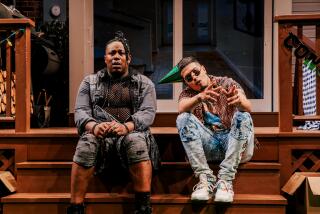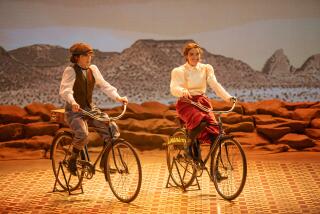Marathon plays stand the test of time

Call it “Long Day’s Journey Into Intermission.” Or maybe “Waiting ... and Waiting ... and Waiting for Godot.”
It is the marathon play or performance piece, the theatrical equivalent of the Tour de France or the nine-course prix fixe menu at the French Laundry. Done poorly it can seem like an endurance test or a stunt. Done brilliantly it can be transformational for those putting on the show as well as those watching it.
Its exemplars are monumental, magisterial works like the Royal Shakespeare Company’s production of “Nicholas Nickleby,” based on Charles Dickens’ 1839 novel, which clocked in at 81/2 hours in two parts (dinner break included) when it opened in London in 1980. Or “The Mahabharata,” first performed in 1985, a nine-hour stage play of the Hindu epic, directed by Peter Brook and subsequently turned into a positively svelte six-hour television version.
PHOTOS: Arts and culture pictures by the Times
The latest heavyweight contender to muscle into a Los Angeles theater is “Gatz,” a roughly 61/2-hour, word-for-word reading-cum-enactment of “The Great Gatsby,” F. Scott Fitzgerald’s Jazz Age novel of irrational exuberance and tragic comeuppance. It opens a nine-performance run Wednesday at the black-box REDCAT theater at Walt Disney Concert Hall.
Performed by 13 cast members of the New York-based Elevator Repair Service company, most playing multiple roles, “Gatz” has been produced across the United States, Europe and in Singapore, earning encomiums at every stop. Along the way, its cast and crew have faced a constant challenge of getting their game faces on, then taking them off, then putting them on again during the play’s intermittent stops and starts.
“We’ve toured the show all over the world, and it’s always funny to hear about what people do offstage sometimes in between their scenes,” says John Collins, the play’s director and one of the company’s co-founders. “They go swimming in the lake in Zurich or they go scope out what the bar’s going to be for after the show, then come back and do their scene.”
Like other plays of Karamazovian proportions, “Gatz” asks much both of both performers and audiences in terms of concentration and stamina. In return, marathon stage works attempt to deliver an artistic experience not of mere diversion but full immersion. Despite or, perhaps, because of their length, they aim to make audiences fully complicit in creating an evening-long alternate reality.
“Once you say that the telling of this tale is going to involve an investment of considerably more time, you find ways to — first of all — believe in it totally,” says Gordon Davidson, who as founding artistic director of the Mark Taper Forum oversaw the development of theatrical sagas such as Tony Kushner’s “Angels in America,” “The Cider House Rules” (adapted from John Irving’s novel), Robert Schenkkan’s Pulitzer Prize-winning drama “The Kentucky Cycle” and the six-hour cycle of “Floating Islands” plays by the Cuban American writer Eduardo Machado.
Davidson says that when he first saw “Gatz” performed in New York, “the performers were so committed, and the structure of it lent itself, if you sat back and relaxed and listened, they created a world for you.”
Of course, short plays can do the same thing, as anyone knows who caught John Hurt’s performance this fall in Samuel Beckett’s 55-minute, one-act, one-man existential rhapsody “Krapp’s Last Tape” at the Kirk Douglas Theatre. But marathon plays, at their most effective, require an act of sustained imaginative commitment that can turn an audience of disparate individuals into a pop-up community, forging a bond that endures far longer than the walk back to the parking lot.
“One of my favorite things about it is, at the end of every show you know that every single person in the theater wants to be in the theater,” says actor and Cal Arts instructor Robert Cucuzza, who in “Gatz” plays the bullying, polo-playing Tom Buchanan, husband of Daisy and romantic rival of James Gatz, the poor Midwestern kid who reinvents himself as the Long Island playboy millionaire Jay Gatsby. “I’ve never experienced that as an audience member or an artist.”
The concept of theater as a multiple-hour or even all-day affair has deep roots. Ancient Greek theater often was performed as a component of religious festivals that could last days or weeks.
Kabuki, the Japanese dance-drama, with its glacially stylized movements, typically is performed in all-day programs. It unfolds as a kind of waking dream in which the action starts slowly and accelerates over the course of several hours, incrementally building to a swift, satisfying resolution that lands like a sword blow.
Shakespeare, who sometimes took his own best advice with a grain of salt (what was that line again about brevity being the soul of wit?), crafted a number of plays that have taxed the attention spans of generations (and, consequently, have been frequently and sometimes brutally abridged). And Eugene O’Neill and George Bernard Shaw certainly never bought into the adage that less is more.
Davidson says it’s important for theaters and theater companies to do works of various lengths, genres and styles to stretch not only the performers’ muscles but the audience’s. “It’s almost like a mandate where you have to keep playing the quartets and the quintets as much as the thundering Beethoven symphony,” he says.
In recent times, even as more “readers” turn to books on tape for their literary encounters, theatrical versions of long novels like “Nicholas Nickleby” and the Tony Award-winning adaptation of John Steinbeck’s “The Grapes of Wrath” by Chicago’s Steppenwolf Theatre Company, have breathed new life into books that fewer people bother to ingest in their full printed form.
It may seem easier to leave the dramatic heavy lifting to the acting pros, and in “Gatz” the acting can be weighty indeed. That’s especially true in “Gatz” for Scott Shepherd and Ben Williams, who alternate the role of Nick Carraway, the narrator of Fitzgerald’s novel, and are onstage in every scene.
But in some ways, the challenges of “Gatz” are even more formidable for actors with fewer lines. Cucuzza, who estimates he’s onstage for about 31/2 hours, says that “the most tiring time for me is the time that I’m offstage.”
“I can completely forget about the show, I can get totally involved in doing my own work,” Cucuzza says. “I do feel like a Rockette sometimes, standing offstage, having a conversation with somebody, and then just turning and walking on.”
For these lulls in the action, the “Gatz” backstage crew maintains a supply of board games. (“Do Not Pass Go, Do Not Collect $200, and Don’t Forget Your Next Line.”) Some cast members have used these occasions to visit their children.
Kristen Sieh, who portrays several characters in “Gatz,” says that for her as a performer, handling a marathon play is a straightforward time-management task of “keeping yourself ready to do good work.” As for the audience, she suggests, don’t sweat it. You’ve got plenty of time.
“Robert Wilson explores this a lot, like saying, ‘Oh, you can just leave. You’re allowed to go pee if you need to and come back,’” Sieh says, referring to the avant-garde director known for his time-devouring choreography.
“There’s people who are like, ‘Oh, a whole day?’ I’m like, ‘Well, what are you doing with your whole day otherwise?’”
MORE
INTERACTIVE: Christopher Hawthorne’s On the Boulevards
TIMELINE: John Cage’s Los Angeles
PHOTOS: Arts and culture in pictures
More to Read
The biggest entertainment stories
Get our big stories about Hollywood, film, television, music, arts, culture and more right in your inbox as soon as they publish.
You may occasionally receive promotional content from the Los Angeles Times.







